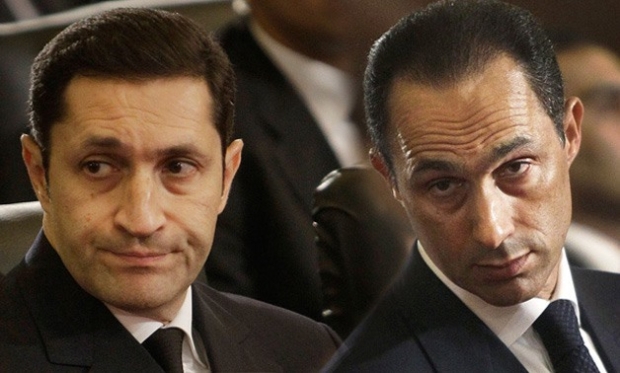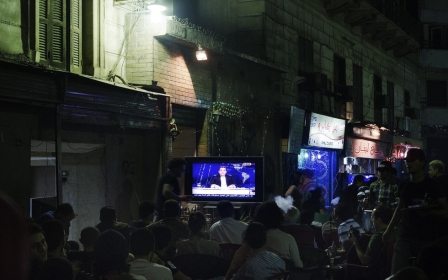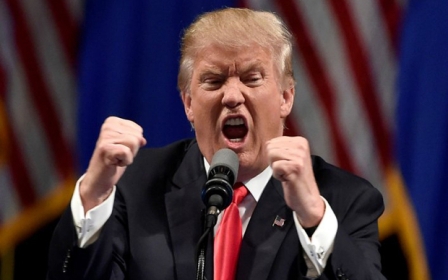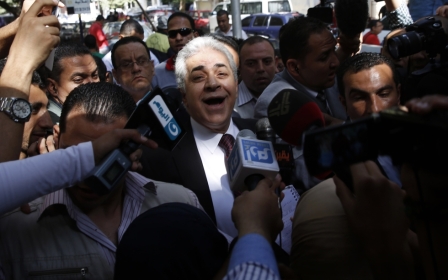The paranoid world of Abdel Fattah el-Sisi
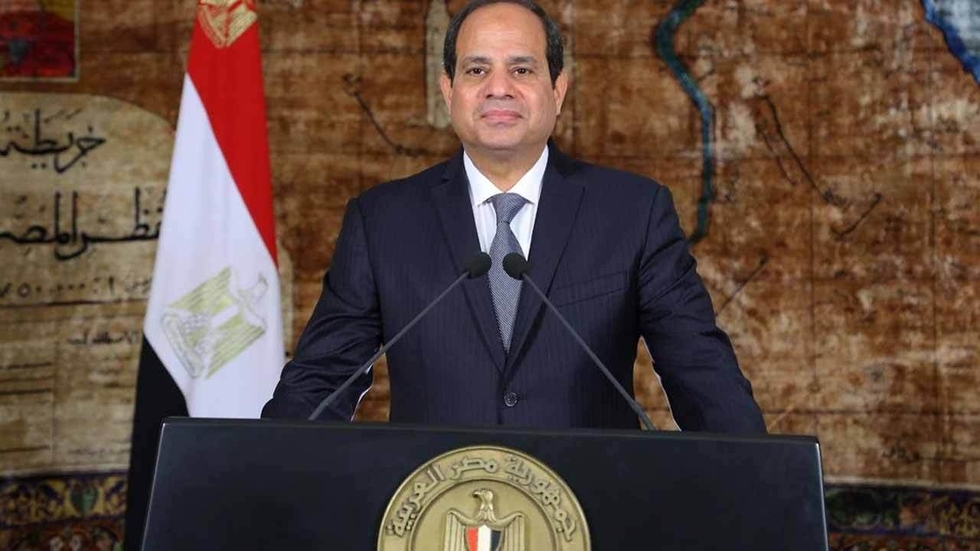
“Just because you are paranoid does not mean they aren’t after you.” Fifty seven years after Joseph Heller wrote his anti-war classic Catch 22, this could be the motto of the man who runs Egypt.
Paranoia has become more than a state of mind for the officer who once cringed before his superiors and who now wields the power of life and death over all. It has become the way Abdel Fattah el-Sisi rules.
Sisi’s Catch 22 goes something like this: “I have to arrest more and more of the people around me, because if I don’t, one of them will get me. After all, I did the same to my president.”
“But the more people I arrest, the greater the chance that one of them will get me. I know that paranoia is a form of madness, but I am only too sane in feeling paranoid.”
The latest objects of Sisi’s paranoia are Gamal and Alaa Mubarak, the sons of Hosni Mubarak. Yasser Risq, chairman and editor in chief of the state run al-Akhbar newspaper peddled the official line. He suspected Gamal was “weaving an agreement with the Brotherhood.”
Although jailed, exiled, and itself divided, the Brotherhood is kept alive in the spin machine of the regime, at the cost of according it more power than it actually has. It is presented as the Satanic hand behind all of Egypt’s ills.
The late Republican senator John McCain received the strangest of obituaries in the state-run Egyptian media who called him “the Supreme Guide of the Muslim Brotherhood”, a stronger guide than either the Turkish president, Recep Tayyip Erdogan, and the emir of Qatar, Tamim bin Hamad Al Thani.
A more likely explanation for their arrests was provided from the camp of the jailed former general and presidential candidate Sami Anan. According to Bahey el Deen Hassan, Mubarak was “sternly warned “ to keep his sons out of politics. But they did not listen, so the courts were brought into play.
A long list
The sons of Mubarak join a growing list of Sisi’s enemies. From the liberal camp there is Mohamed ElBaradei, the comedian Bassem Youssef who is exiled in LA; from the leftist camp there is Khaled Ali, Masoum Marzouk, and Hamdeen Sabbahi, who is still free but against whom legal complaints have been filed. From the youth activists there is Haitham Mohamadeen, Shady al Ghazaly Harb; from the April 6 movement there is Ahmed Maher, Mohammed Adel and Israa Abdelfattah; from the military there is Sami Anan and Ahmed Shafiq; from the bureaucrats there is Hisham Geneina; among authors Fatima Naoot; from the MPs Anwar Sadat.
Incapable of establishing a class of businessmen, political parties and institutions who thrive off him, Sisi has travelled further and further down the road of oppression and isolation.
None of these are Islamists and many supported the coup against the former Muslim Brotherhood president Mohamed Morsi.
Friends and family are not excluded. Mahmoud Hegazy was fired as armed forces chief, despite the fact that one of Sisi’s sons is married to Hegazy’s daughter. The same fate awaited the allegedly unsackable defence minister General Sedki Sobhi.
An opposition group this disparate has only one thing in common: they may have started their journeys under Sisi in different places, but they all ended it in the same one: house arrest, prison or exile.
All of them failed to see at the time of the military coup that Sisi was only ever going to be one-way traffic. Having dispensed with the Islamists, leftists and liberals, it was only a matter of time before he would turn his attention to regime loyalists.
Incapable of doing the right thing as someone who lacks legitimacy - and that is to create it by establishing a class of businessmen, political parties and institutions who thrive off him - Sisi has travelled further and further down the road of oppression and isolation.
Dangerous talk
To open your mouth in Egypt is to risk arrest. Social media has become a trap. You can be convicted on the basis of a screen shot. Blogs and accounts with more than 5,000 followers are monitored by the State Media Council for “fake news or incitement to illegal actions, violence or hate”.
Since December, Amnesty has documented 111 arrests for peacefully expressing opinions or taking part in protests. Seventy of them face prison sentences of up to 15 years.
On 12 May, a protest against increased metro fares was violently dispersed, and 35 were arrested on charges of “unauthorised protest” and “joining a terrorist group”.
Najia Bounaim, Amnesty International’s North Africa campaigns director, called the current crackdown unprecedented, even by Egypt’s low standards: “It is currently more dangerous to criticise the government in Egypt than at any time in the country’s recent history. Egyptians living under President al-Sisi are treated as criminals simply for peacefully expressing their opinions,” she said.
Mubarak’s sons are no stranger to arrest and prison. Arrested in 2011, they had several spells in prison but have been free for the past three years. The case against them has been gathering dust in Sisi’s top draw, and only came out when Sisi realised that Gamal got warm receptions from the public.
Their arrests were preceded by the unexplained disappearance of a number of talk show hosts whose stock in trade was their loyalty to the regime. Mustafa Bakry, a pro-Sisi MP, said on his TV show on Al Balad TV.
“We have the right to breath, to speak, to talk. The media personnel who are sent to their homes: why is this happening? They will become time bombs. They will stand against the state. They’re 600-700 people. What is going on?” he exclaimed.
I am sure he himself will soon find out when he is taken off air. Bakry named Lamees al-Hadidi and Wael al-Ibrashi as celebrities whose fates were unknown.
The Mubarak clan had strong ties to Saudi Arabia, developed by the father Hosni and the Gulf is heavily invested in the pliant flock of talk show hosts, who are only now on the receiving end of the tyranny that they helped foster. If Sisi is kicking against his paymasters, he is truly delusional.
Trump's price
Donald Trump will not come to his rescue. His foreign policy amounts to cash on demand : "We protect the countries of the Middle East, they would not be safe for very long without us, and yet they continue to push for higher and higher oil prices! We will remember. The OPEC monopoly must get prices down now!” Trump wrote in his latest tweet.
Dictators do not learn from each other. Mubarak travelled the same journey as Sisi, opening up a measure of political freedom in 2005 only to slam it shut against in 2010. Mubarak assembled a disparate group of enemies who came together to unseat him. Sisi, with more blood on his hands, is doing the same.
If the Egyptian opposition appear hopeless and disunited, Sisi is doing them a great favour in uniting them.
Should Sisi travel to the UN General Assembly in New York to deliver his speech? Can he leave the shop in safe hands? Maybe, or there again, maybe not. He can never be sure.
- David Hearst is editor-in-chief of Middle East Eye. He was chief foreign leader writer of The Guardian, former Associate Foreign Editor, European Editor, Moscow Bureau Chief, European Correspondent, and Ireland Correspondent. He joined The Guardian from The Scotsman, where he was education correspondent.
The views expressed in this article belong to the author and do not necessarily reflect the editorial policy of Middle East Eye.
Photo: Egyptian President Abdel Fattal al-Sisi (AFP)
This article is available in French on Middle East Eye French edition.
Middle East Eye propose une couverture et une analyse indépendantes et incomparables du Moyen-Orient, de l’Afrique du Nord et d’autres régions du monde. Pour en savoir plus sur la reprise de ce contenu et les frais qui s’appliquent, veuillez remplir ce formulaire [en anglais]. Pour en savoir plus sur MEE, cliquez ici [en anglais].



